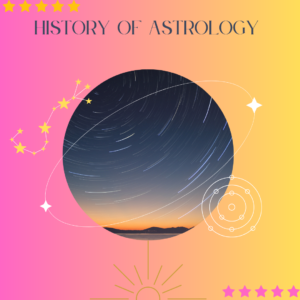Astrology is the practice of interpreting the influence of the stars and planets on human affairs and destiny. The history of astrology is long and complex, with origins in ancient Mesopotamia and continued interest into modern times: 
-
-
Origins
Astrology likely originated in Mesopotamia in the second millennium BC as a way to predict the seasons and when to plant and harvest crops. The Babylonians developed 12 astrological signs, some of which are still used in the Western zodiac today.
-
Development in Greece and Rome
The ancient Greeks invented astronomy from astrology and developed the zodiac symbols and names used today. The Greco-Roman astrologer and astronomer Ptolemy’s Tetrabiblos laid the foundation for Western astrology. The first definite reference to astrology in Rome was by Cato in 160 BCE.
-
-
Middle Ages
Astrology was widespread in Europe and influenced everyday decisions. Astrologers were often found at royal courts, where they provided horoscopes to monarchs.
-
Renaissance
Interest in astrology increased on a personal and philosophical level.
-
Modern times
Interest in astrology has continued into modern times, and astrological signs are still widely believed to influence personality. However, a 1985 experiment found that predictions based on natal astrology were no better than chance.



